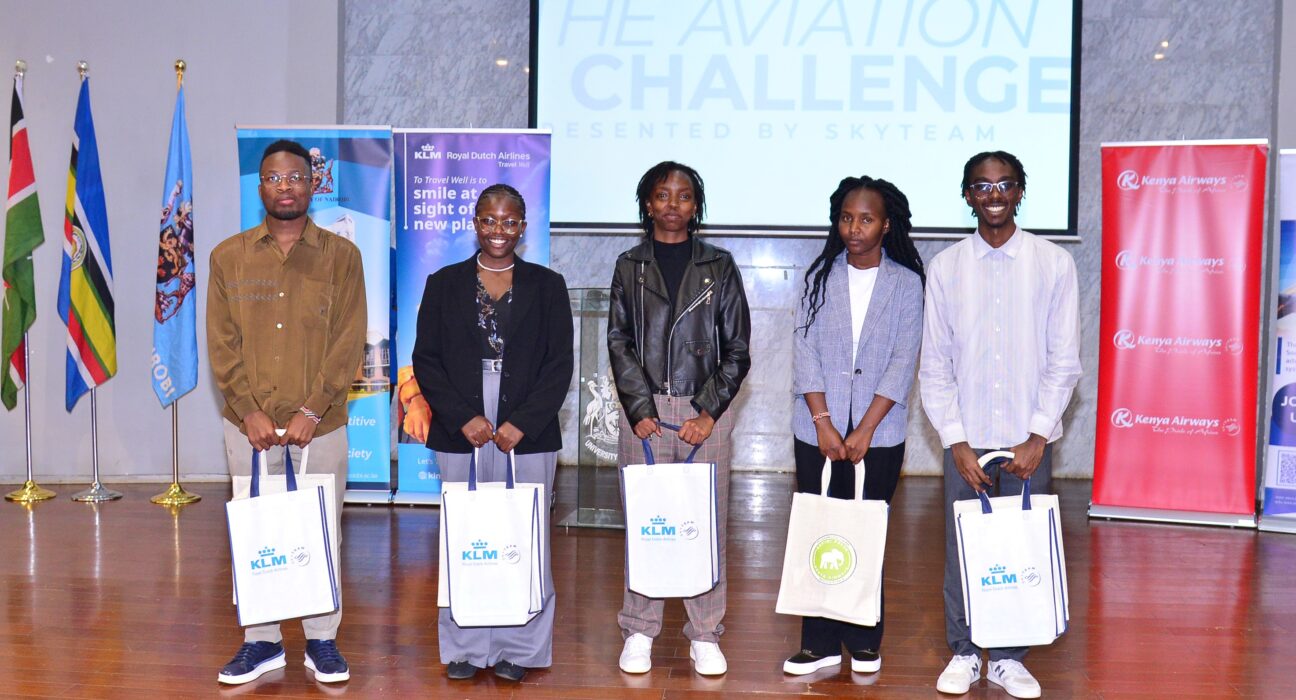In a move aimed at fostering locally driven innovation in sustainable air travel, KLM Royal Dutch Airlines and Kenya Airways (KQ) have jointly engaged over 200 engineering students from the University of Nairobi, offering mentorship and incubation opportunities for projects focused on decarbonizing aviation.
The event, held at the University’s School of Engineering, formed part of The Aviation Challenge (TAC) — a SkyTeam alliance sustainability initiative that brings together member and partner airlines worldwide to accelerate progress toward net-zero emissions in aviation. The Nairobi engagement marks the first time the challenge has featured a Kenyan university as a regional innovation hub.
Empowering Young Engineers for a Greener Sky
During the session, students presented groundbreaking concepts ranging from renewable aviation fuel systems to low-emission airport mobility solutions. The young innovators received direct feedback from KLM and Kenya Airways engineering and sustainability teams, with selected projects now under review for potential incubation and further development.
“These students are thinking boldly about Africa’s role in the future of flight,” said Zita Schellekens, Senior Vice President of Sustainability, Strategy and Transformation at Air France–KLM. “This is talent that can be mentored and supported to build the foundation for regionally driven solutions to global aviation challenges.”
The collaboration underscores the growing recognition of universities as key partners in shaping the next generation of sustainable technologies. Kenya Airways and KLM executives noted that the partnership aims not only to identify promising ideas but also to equip young engineers with the knowledge and networks required to turn concepts into viable innovations.
Linking Academia and Industry
KLM and KQ conducted a masterclass during the event, guiding students through emerging trends in green aviation. The topics included Sustainable Aviation Fuel (SAF), emissions reduction technologies, and engineering pathways for carbon-neutral aircraft operations.
Participants explored the challenges of balancing operational efficiency with environmental sustainability — a complex area that airlines across the world are increasingly prioritizing. Kenya Airways and KLM leaders emphasized that aligning academia with industry efforts is essential to achieving meaningful decarbonization in air travel.
“We believe that collaboration between industry and academia will accelerate the development of homegrown solutions to global aviation issues,” said a Kenya Airways sustainability representative. “Kenyan talent can play a pivotal role in developing technologies and practices that make flight more sustainable, both regionally and globally.”
The Aviation Challenge: A Global Sustainability Platform
The Aviation Challenge (TAC) was launched by the SkyTeam alliance as part of its long-term commitment to reducing aviation’s carbon footprint. The initiative brings together airlines to pilot innovative sustainability projects, ranging from operational efficiency improvements to the adoption of cleaner fuels.
In 2023, TAC featured 24 airlines conducting 33 showcase flights around the world to demonstrate advancements in climate-friendly aviation. This year, Nairobi has been designated as one of the regional hubs, reflecting growing recognition of Africa’s role in the global sustainability movement.
As part of the 2025 edition of TAC, KLM will operate showcase flights to Nairobi, spotlighting its use of Sustainable Aviation Fuel (SAF) and other green aviation practices. SAF, which can reduce lifecycle carbon emissions by up to 80 percent compared to traditional jet fuel, is increasingly seen as a key transition technology in the path to net-zero aviation.
Building Africa’s Capacity in Green Aviation
The engagement between the two airlines and the University of Nairobi represents more than a mentorship program — it is part of a broader strategy to build local expertise in aviation sustainability. With global aviation under mounting pressure to cut emissions, Africa’s universities and technical institutions are being called upon to contribute research and talent that can shape greener technologies.
Kenya, home to one of the region’s most dynamic aviation sectors, is strategically positioned to become a hub for sustainable flight innovation. Nairobi’s Jomo Kenyatta International Airport (JKIA) already serves as a major regional gateway, and ongoing partnerships with global airlines have the potential to catalyze research and development in the sector.
“Africa has an incredible pool of young engineers and scientists,” said a KLM technical training manager during the session. “By providing mentorship and exposure to real-world aviation challenges, we can empower these students to develop practical, scalable solutions that support the industry’s transition to greener operations.”
Nurturing Innovation and Collaboration
Students at the University of Nairobi described the event as an eye-opening opportunity to engage with industry experts and gain insight into the engineering challenges of sustainable aviation. Many expressed enthusiasm about the airlines’ willingness to consider student-led ideas for further support and potential implementation.
“I was inspired to see that global airlines are paying attention to innovations coming out of African universities,” said Grace Njeri, a fourth-year mechanical engineering student whose team proposed a renewable fuel micro-refinery model for local airports. “It gives us confidence that our work can have a real impact on how aviation evolves.”
The partnership also aligns with Kenya Airways’ long-term sustainability agenda, which includes exploring renewable fuels, fleet modernization, and operational efficiency improvements. Similarly, KLM — which has been a global pioneer in testing SAF and other green technologies — continues to expand its sustainability footprint in Africa through collaborations and knowledge-sharing programs.
Aligning with Global Goals
The collaboration supports the broader United Nations Sustainable Development Goals (SDGs), particularly SDG 9 (Industry, Innovation and Infrastructure) and SDG 13 (Climate Action). It also reinforces Kenya’s Vision 2030 and national commitments to green growth and innovation-led development.
By embedding sustainability learning into engineering education, the initiative aims to prepare a new generation of professionals capable of designing solutions for the aviation industry’s complex climate challenges.
Industry observers note that the event represents a positive model for cross-sector collaboration, where academia, government, and private enterprise converge to advance environmental and technological goals.
As KLM and Kenya Airways continue reviewing the student proposals, both airlines have indicated their intent to provide mentorship, technical input, and possible pilot project support for the most promising innovations.
The long-term goal, according to organizers, is to ensure that the ideas conceived in Kenyan classrooms can one day help decarbonize flight routes across Africa and beyond.





